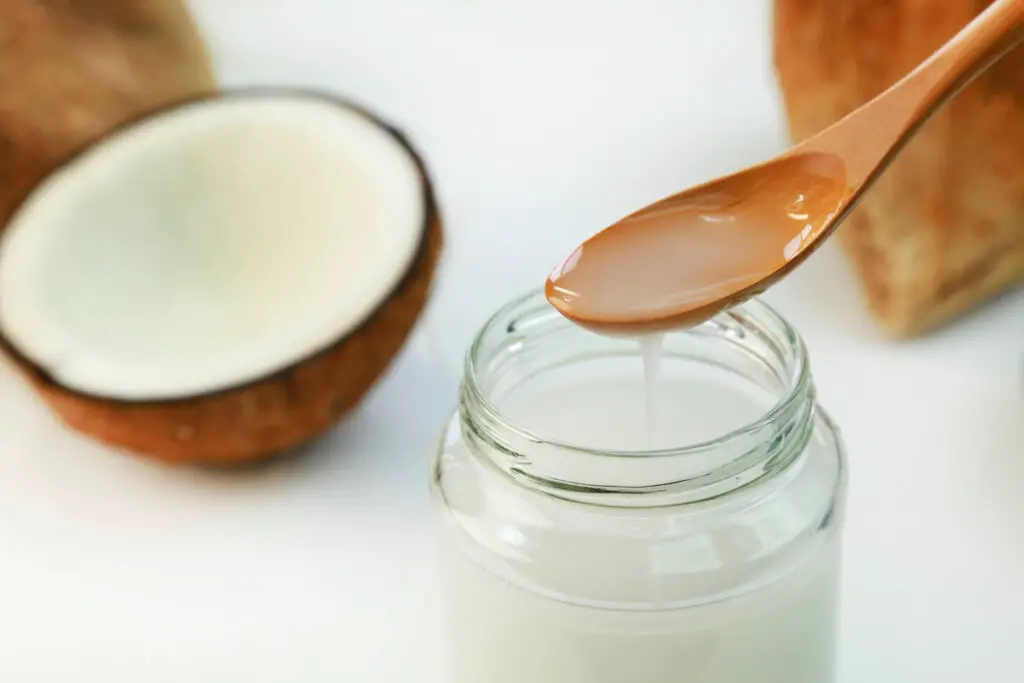
Coconut oil is increasingly being used as an alternative treatment for psoriasis. Psoriasis is a chronic, inflammatory autoimmune disease that affects the skin, resulting in red and scaly patches on the skin surface.
If you or someone you love is suffering from psoriasis, we may have some helpful advice for you: using coconut oil. Coconut oil has tons of benefits and replenishes and nourishes the skin with its natural properties.
This post will provide an overview of many ways to use coconut oil for psoriasis along with its other benefits. Read if you’re looking for relief from itchy, red patches on your skin!
Contents
- 1 Ways To Use Coconut Oil For Psoriasis:
- 2 7 Benefits of Using Coconut Oil for Psoriasis:
- 3 Precautions While Using Coconut Oil for Psoriasis:
- 4 Other Natural Treatments for Psoriasis:
- 5 What Coconut Oil Is Best for Psoriasis?
- 6 Does Coconut Oil in Bath Help Psoriasis?
- 7 How Does Coconut Oil Work on Scales and Patches?
- 8 Tips for Treating Scalp Psoriasis With Coconut Oil?
- 9 Conclusion:
Ways To Use Coconut Oil For Psoriasis:
Here are 4 different ways to use coconut oil for psoriasis:
1. Applying It Directly:
One of the most popular ways to use coconut oil for psoriasis is by applying it directly on the affected areas of the skin.
Applying a thin layer of coconut oil two to three times per day can help reduce inflammation, itchiness, and dryness associated with psoriasis.
Additionally, its moisturizing properties can help reduce irritation from tight clothing or certain fabrics like wool or polyester.
2. Consuming it Orally:
Another way that coconut oil can be beneficial for treating psoriasis is by consuming it orally.
When taken internally, coconut oil helps reduce inflammation in the body as well as boosts immunity against infections as well as other diseases.
Additionally, it’s also known to improve digestion and nutrient absorption which are important factors when it comes to managing psoriasis.
It’s recommended to start with smaller doses such as one teaspoon twice daily before increasing the dosage gradually over time if needed.

3. Mixing it With Essential Oils:
Finally, you can also add a few drops of essential oils such as lavender or rosemary essential oils to your coconut oil before applying it to your skin for additional benefits.
These essential oils contain antifungal properties which are known to help fight off any bacterial or fungal infection causing your psoriasis flare-up while still keeping your skin hydrated and moisturized at all times.
4. Use a Topical Cream Containing Coconut Oil
If you don’t want to use pure coconut oil for your psoriasis treatment, you may opt for products that contain this ingredient instead.
For example, there are many topical creams available on the market today that contain coconut oil as one of their active ingredients – these creams are designed specifically for treating psoriatic skin conditions such as plaque psoriasis and scalp psoriasis.
Make sure you choose a product that is free from fragrances and harsh chemicals which could further irritate your skin condition.
7 Benefits of Using Coconut Oil for Psoriasis:
Here are the top 7 Benefits of Using Coconut Oil for Psoriasis:
1. Anti-Inflammatory Properties:
Coconut oil has anti-inflammatory properties, which can help reduce the inflammation associated with psoriasis.
The lauric acid and capric acid in the coconut oil help to control the levels of inflammation in the body and reduce skin irritation caused by psoriasis.
2. Provides Moisturization:
Using coconut oil for psoriasis helps to keep the skin hydrated, aiding in reducing the redness and itching that is associated with this condition.
It works as an emollient to lock moisture into the skin and prevent dryness.
3. Protects From Environmental Factors:
Coconut oil also provides a protective layer on the skin, shielding it from further damage due to sun exposure and other environmental factors that may trigger a psoriatic flare-up.
4. Rich in Antioxidants:
Coconut oil is rich in antioxidants, which can help protect against free radical damage that can worsen psoriasis symptoms, such as inflammation and itching.
5. Antibacterial Properties:
The antibacterial nature of coconut oil helps to fight off bacteria on the skin’s surface that could further aggravate psoriatic lesions or cause infection at the site of these lesions.
6. Rich in Vitamin E:
Coconut oil contains Vitamin E which helps soothe irritated and inflamed skin caused by psoriasis, providing relief from itchiness and discomfort associated with this condition.
7. Natural Fatty Acids:
The natural fatty acids present in coconut oil are known to improve cell regeneration, which is essential for any healing process, including treating psoriatic plaques or lesions on the skin’s surface.
Precautions While Using Coconut Oil for Psoriasis:
Although coconut oil is generally safe to use for psoriasis, you must do a patch test before applying directly on your skin.
Take a small amount of the oil and apply it on an unaffected area of skin and wait for 30 minutes or more to check for any allergic reaction or irritation.
If everything looks fine then you can go ahead with the application on your psoriatic lesions.
Other Natural Treatments for Psoriasis:
Apart from using coconut oil for psoriasis, there are other natural remedies you can turn to control the symptoms of this condition.
Some of these include applying aloe vera gel or oatmeal paste on the affected areas, soaking in a warm bath with Epsom salt and baking soda, taking herbal supplements such as turmeric, ginger, or omega-3 fatty acids, and using essential oils such as tea tree oil or lavender oil.
What Coconut Oil Is Best for Psoriasis?
The best coconut oil for psoriasis is cold-pressed, unrefined, extra-virgin coconut oil.
This type of oil has a higher concentration of lauric acid which can help soothe the symptoms associated with psoriasis.
Additionally, it’s also free from additives or chemical processing that could further irritate the skin.
Does Coconut Oil in Bath Help Psoriasis?
Adding a few tablespoons of coconut oil to your bath can also help in treating psoriasis.
The warm moisture helps to improve circulation throughout the body and opens up the pores, allowing the skin to absorb all the beneficial properties present in this oil.
This makes it easier for your skin to retain hydration, reducing any irritation or itching associated with this condition.
How Does Coconut Oil Work on Scales and Patches?
Coconut oil helps to soften the scales and patches associated with psoriasis by providing a protective layer on the skin.
This helps to lock moisture in, reducing any dryness and flaky skin caused by this condition.
Additionally, its anti-inflammatory properties help to reduce inflammation and pain at the site of these lesions.
Tips for Treating Scalp Psoriasis With Coconut Oil?
Here are some tips to treat scalp psoriasis with coconut oil:
1. Gently massage the coconut oil onto your scalp and let it sit for 30 minutes or more before washing it off.
2. Use a gentle shampoo to wash your hair, as harsh products can further irritate inflamed skin.
3. Use a soft brush or comb to remove any flakes from the scalp.
4. Follow up your coconut oil treatment with a moisturizing conditioner to keep the scalp hydrated and reduce any itching sensation.
Conclusion:
In conclusion, using coconut oil is an effective way to ease the symptoms of psoriasis without having to resort to medications or harsh treatments.
Whether you choose to use pure coconut oil topically or opt for a topical cream containing this ingredient – it can be an incredibly helpful tool in managing your condition over time!
If you have any questions about using coconut oil for treating your condition, please consult with your doctor first before starting any new treatments or supplements!














